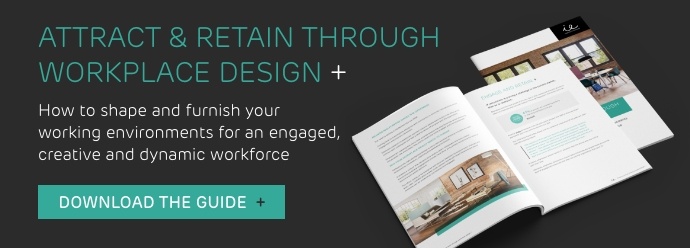Earlier this year, the Mayor of London, Sadiq Khan, announced a new menopause policy that will support women and all workers going through menopause.
The policy was created in conjunction with Unison, who have long campaigned to help employers understand the effects of menopause on workers. It aims to ensure the working environment is comfortable wherever possible and includes looking at things like temperature control and flexible adjustments in the working day for those experiencing severe symptoms.
This move mirrors the broader focus on employee wellbeing and the importance of creating a comfortable working environment for all to thrive that is increasingly shared amongst employers.
Menopause is a workplace issue
The impact of menopause in the workplace is huge and often underestimated. According to Unison:
Nearly 8 out of 10 menopausal women are in work.
45% of women say symptoms have a negative impact on their work.
A poll of almost 4,000 women showed just how crippling menopause symptoms can be on women's careers:
- 99% said their perimenopausal or menopausal symptoms had negatively impacted their careers
- 59% had taken time off work due to their symptoms - 18% of which were off work for over eight weeks
- Half of those who took at least eight weeks off work resigned or took early retirement
Common symptoms of menopause include fatigue, anxiety, hot flushes, migraines, moments of 'brain fog' and difficulty concentrating. Not everyone experiences these symptoms, but for those who do, it can be debilitating.
Unison general secretary Christina McAnea says:
"The emotional and physical changes of the menopause can't be underestimated. Nor can their effect on women's jobs. Good employers want to ensure the best possible working environment. Women must be able to do their jobs in comfort and not feel stigmatised either."
It's a pressing issue for employers. The average menopause age is 51, and by 2030, 1 in 3 UK workers will be over 50.
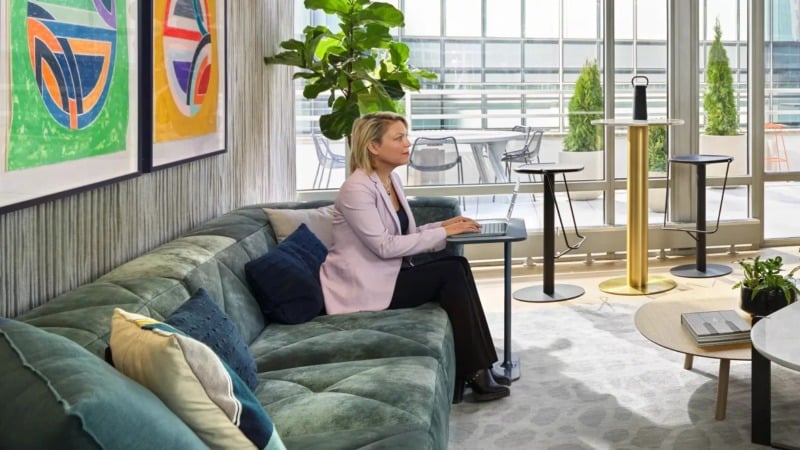
But it's not the only one
Menopause isn't the only women's health issue that impacts women at work. Menstruation, pregnancy, postnatal depression, fertility treatment, and hormonal and gynecological conditions like PMDD and endometriosis can all have a negative impact on women's working lives.
A Women's Health magazine poll found that:
57% of women who struggle with a hormonal or gynaecological condition believe it has harmed their career.
And a study by Radboud University in the Netherlands found working through period pain and other disabling premenstrual symptoms accounts for an average of nine days of lost productivity per person, per year.
With women making up a vast proportion of the workforce, businesses need to offer proper support to improve the working experience.
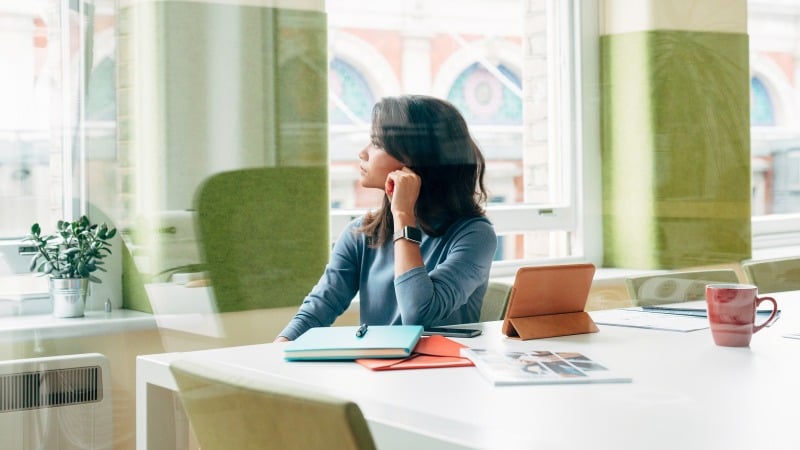
How to design menopause-friendly workplaces
Examples of ways workplace design can support women going through menopause include:
Control over temperature and lighting
Women experiencing menopausal symptoms will benefit from being able to regulate their temperature without concern over inconveniencing colleagues. So if they're having a hot flush, they can create a cooler space.
With the rise of hybrid working and hot desking, allowing employees access to environmental information on temperature across the office would enable individuals to book a desk at a location where they would feel more comfortable.
The ability to adjust the temperature could benefit others, too, such as those experiencing hormonal changes due to gender transitioning, PMT, and IVF.
Control over lighting in a space is equally important. Workers should be able to make adjustments, such as changing the lux levels if they are sensitive to the light. LED lights tend to be better as they don't give off any heat.
Calming colours and textures
Neutral shades, textured fabrics and elements of biophilia can help soften a space and have a calming effect, which can benefit menopausal women experiencing anxiety and fatigue.
.jpg?width=800&name=My%20project-1%20(22).jpg)
Private spaces to retreat
It's also helpful to have a quiet, calming space where women experiencing menopausal symptoms can find refuge away from the rest of the workplace, whether they want to do focused work or relax and recharge. This would also benefit other employees who may experience hypersensitivity or migraines triggered by noise or glare.
Pods like Orangebox’s AIR3 are perfect for creating a space for people to retreat when they need privacy and quiet. Air3 is completely enclosed and has an integrated lighting and ventilation system, allowing lighting and air circulation in the pod to be controlled separately from the rest of the office.
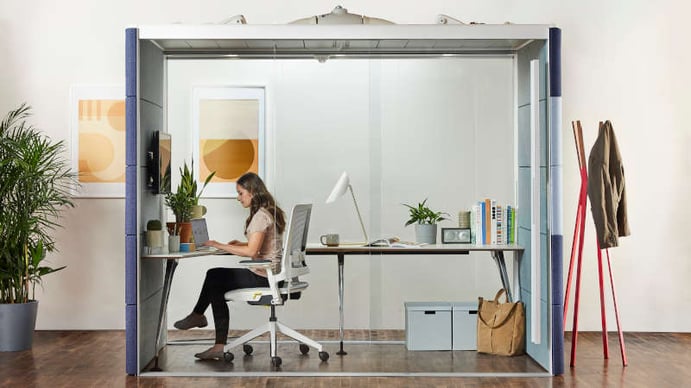
Wellbeing rooms
A wellbeing room is more than just a breakout area; it's a space in the office designed for employees to take time out to tend to their own personal health needs.
Not only are wellbeing rooms beneficial for menopausal women, but also for those who need to breastfeed or pump milk or those who need to take regular meditation or give themselves injections, such as women going through fertility treatment.
Private meeting spaces
Private meeting spaces with solid walls or glass that can be obscured are also important. Despite greater awareness of the debilitating effects of menopause, having a private space to meet with a manager or HR, where they know colleagues can't see them, can make women more likely to seek support when needed.
Campers and Dens by Orangebox is a modular meeting room system that comes with many configurations, including a frosted manifestation on the glass panels that prevent people from being able to see in.
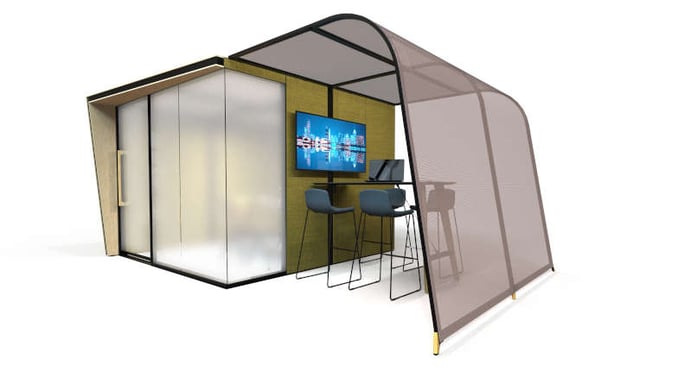
Of course, all these design features will benefit every employee, not just women going through menopause.
Summary
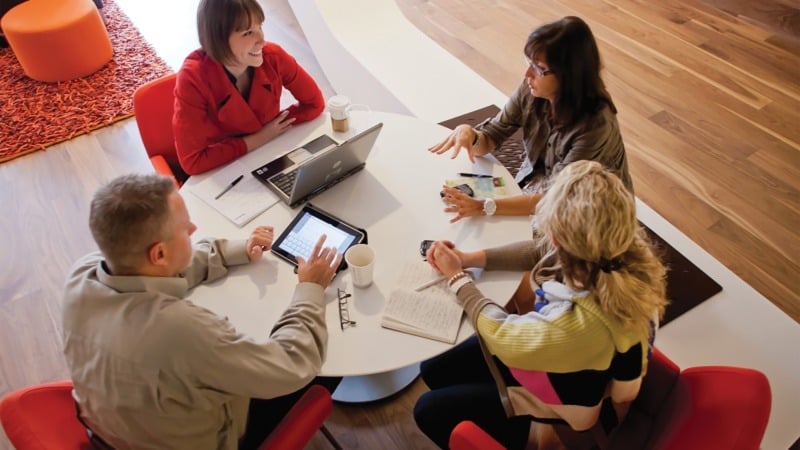
The impact of the menopause, as well as other health issues, on women’s working lives can’t be ignored. And the belief that you can’t separate a person’s health from how they show up at work, is likely to become increasingly dominant as younger generations move into more senior positions.
Creating workspaces that cater for every individual - whatever their gender, age, ability, or health status - is paramount for employers wanting to attract and retain the brightest talent.






